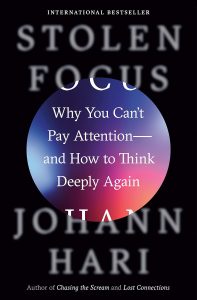What We’re Reading: “Stolen Focus: Why You Can’t Pay Attention – and How to Think Deeply Again” by Johann Hari
Stolen Focus: Why You Can’t Pay Attention – and How to Think Deeply Again by Johann Hari
Seeking to find flow, engage in play, and grant ourselves the grace and space to think deeply
 I had a hard time selecting a book to read for the purposes of this blog post, and I think that it had a lot to do with being distracted. Like so many others, I find myself increasingly distracted; consumed by an overabundance of tasks, information, and obligations, so that taking a moment to select and read a book felt like a great indulgence.
I had a hard time selecting a book to read for the purposes of this blog post, and I think that it had a lot to do with being distracted. Like so many others, I find myself increasingly distracted; consumed by an overabundance of tasks, information, and obligations, so that taking a moment to select and read a book felt like a great indulgence.
To make the selection, I turned to the recommended reading list of Adam Grant, bestselling author and professor of organizational psychology at the Wharton School. When I saw Johann Hari’s book Stolen Focus on this list and its assurance of explaining to me why I can’t pay attention, I thought, “Count me in!”
Hari’s book is an engaging mix of journalistic inquiry, historical research, and personal memoir. Looking back as far as ancient Rome, Hari draws a map that confidently argues that the distance between distraction and deep thought has been collapsing for a long-time, and has exponentially accelerated over the past two decades with the introduction of technology apps designed with a business model built around “screen time, not life time.”
Most humans spend their days staring at screens, scrolling images, scrambling to keep up. We tell ourselves we are being productive as we move at this pace. While many of us like to think that we are multi-tasking, Hari’s book points out that in fact, multitasking is a term “created in relation to computers, not humans.” What we are in fact doing is juggling – switching back and forth between tasks – and it is actually degrading our ability to focus, and has been shown in studies to lower worker’s IQs and productivity.
In addition to juggling, we are a society constantly besieged by interruptions. Research has shown it takes, on average, twenty-three minutes for one’s attention to return to a state of refocus after an interruption. Hari states, “If you have been interrupted enough in your daily life, you will start to interrupt yourself even when you are set free from all these external interruptions.” I find this to be true in my own life; sitting still to read a book is always fraught with thoughts of ‘output’ and even laziness.
It would be easy to place the blame solely on the tech industry for the degradation of our ability to focus and think deeply. However, Hari’s book highlights how systems and conditions such as global economic growth, pollution, lack of sleep, poor diet, and the loss of play and the time to daydream contribute to what ails us as well. In some ways, I found these observations to be of the greatest interest: We haven’t been driven to distraction, but have instead been programmed into it by our environment and business models that are based upon viewing humans as data sets to be bought and sold. We have become a society under a constant state of interruption, which has led to sleep disturbance, poor nutrition, inflated intellectual confidence, and anxiety.
Regardless of the trigger, the overarching outcome of our ever decreasing ability to focus weighs heavily on our ability as a society to feel empathy for others and to solve complex problems. Watching what has unfolded across the world (online and IRL) over the past two years has been sobering and left many attention casualties in its wake. Like Hari, I feel that if left unaddressed, what we have witnessed will only get worse.
Offering both actionable individual solutions and societal approaches, Hari’s book, Stolen Focus, is a fascinating exploration of the systemic destruction of our attention. And, as Hari states himself, “No answer will be perfect but if we wait for perfection, we will be waiting forever.”
Pre-committing to a plan of action, installing apps that cut access to the internet at programmed intervals, and using a timed lock box are some of the suggestions Hari offers (and uses himself) to reduce distraction and promote focus. This reader is not quite willing to lock myself down just yet; however, I have taken the step of disabling notifications on my cellphone so that I no longer hear or feel the vibration – the siren song if you will – of distraction. Additionally, after reading Stolen Focus, I have found myself thinking more deeply about how I am consuming information about our world. In doing so, I can definitely see where my understanding of the most pressing issues of our day has been dulled by moving too quickly.
In the end, Stolen Focus gave me the opportunity to look more carefully at the downstream effects of my own behavior of consuming information and approaching daily tasks, and it has inspired me to spend less time scanning and more time reading deeply.
